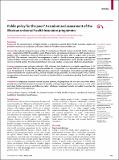| dc.contributor.author | King, Gary | |
| dc.contributor.author | Gakidou, Emmanuela | |
| dc.contributor.author | Imai, Kasuke | |
| dc.contributor.author | Lakin, Jason | |
| dc.contributor.author | Moore, Ryan T. | |
| dc.contributor.author | Nall, Clayton | |
| dc.contributor.author | Ravishankar, Nirmala | |
| dc.contributor.author | Vargas, Manett | |
| dc.contributor.author | Téllez-Rojo, Martha Maria | |
| dc.contributor.author | Ávila, Juan Eugenio Hernández | |
| dc.contributor.author | Ávila, Mauricio Hernández | |
| dc.contributor.author | Llamas, Héctor Hernández | |
| dc.date.accessioned | 2011-09-13T17:38:06Z | |
| dc.date.issued | 2009 | |
| dc.identifier.citation | King, Gary, Emmanuela Gakidou, Kosuke Immai, Jason Lakin, Ryan T. Moore, Clayton Nail, Nirmala Ravishankar, et al. 2009. Public policy for the poor? A randomised assessment of the Mexican universal health insurance programme. Lancet 373(9673): 1447-54. | en_US |
| dc.identifier.issn | 0140-6736 | en_US |
| dc.identifier.uri | http://nrs.harvard.edu/urn-3:HUL.InstRepos:5130448 | |
| dc.description.abstract | Background: We assessed aspects of Seguro Popular, a programme aimed to deliver health insurance, regular and preventive medical care, medicines, and health facilities to 50 million uninsured Mexicans. Methods: We randomly assigned treatment within 74 matched pairs of health clusters—ie, health facility catchment areas—representing 118 569 households in seven Mexican states, and measured outcomes in a 2005 baseline survey (August, 2005, to September, 2005) and follow-up survey 10 months later (July, 2006, to August, 2006) in 50 pairs (n=32 515). The treatment consisted of encouragement to enrol in a health-insurance programme and upgraded medical facilities. Participant states also received funds to improve health facilities and to provide medications for services in treated clusters. We estimated intention to treat and complier average causal effects non-parametrically. Findings: Intention-to-treat estimates indicated a 23% reduction from baseline in catastrophic expenditures (1·9% points; 95% CI 0·14–3·66). The effect in poor households was 3·0% points (0·46–5·54) and in experimental compliers was 6·5% points (1·65–11·28), 30% and 59% reductions, respectively. The intention-to-treat effect on health spending in poor households was 426 pesos (39–812), and the complier average causal effect was 915 pesos (147–1684). Contrary to expectations and previous observational research, we found no effects on medication spending, health outcomes, or utilisation. Interpretation: Programme resources reached the poor. However, the programme did not show some other effects, possibly due to the short duration of treatment (10 months). Although Seguro Popular seems to be successful at this early stage, further experiments and follow-up studies, with longer assessment periods, are needed to ascertain the long-term effects of the programme. Funding: Mexican Ministry of Health, the National Institute of Public Health of Mexico, and Harvard University Institute for Quantitative Social Science | en_US |
| dc.description.sponsorship | Government | en_US |
| dc.language.iso | en | en_US |
| dc.publisher | Elsevier | en_US |
| dc.relation.isversionof | doi:10.1016/S0140-6736(09)60239-7 | en_US |
| dc.relation.hasversion | http://gking.harvard.edu/files/spi.pdf | en_US |
| dash.license | LAA | |
| dc.title | Public Policy for the Poor? A Randomised Assessment of the Mexican Universal Health Insurance Programme | en_US |
| dc.type | Journal Article | en_US |
| dc.description.version | Version of Record | en_US |
| dc.relation.journal | Lancet | en_US |
| dash.depositing.author | King, Gary | |
| dc.date.available | 2011-09-13T17:38:06Z | |
| dc.data.uri | http://hdl.handle.net/1902.1/11044 | en_US |
| dc.data.uri | http://hdl.handle.net/1902.1/11044 | en_US |
| dc.data.uri | http://hdl.handle.net/1902.1/11044 | en_US |
| dc.identifier.doi | 10.1016/S0140-6736(09)60239-7 | * |
| dash.authorsordered | false | |
| dash.identifier.orcid | 0000-0002-5327-7631 | * |
| dash.contributor.affiliated | King, Gary | |


